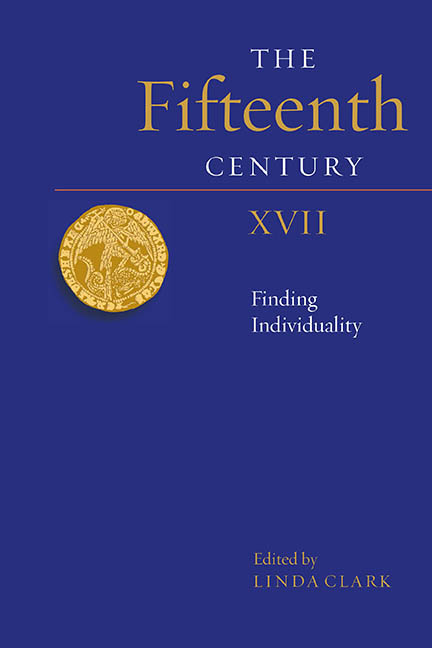Book contents
- Frontmatter
- Contents
- Contributors
- Preface
- Abbreviations
- Royal Wills, 1376–1475
- Propaganda, Piety and Politics in the Fifteenth Century: Henry V’s Vernacular War Letters to the City of London, 1417–21
- ‘To Be of Oon Demeanyng and Unite for the Wele of Your Self and of the Contre There’: Yorkist Plans for the Lordship of Ireland, the Last Phase
- A Mirror for a Princess: Antoine de la Sale and the Political Psyche of Margaret of Anjou
- Margaret of Anjou and the Language of Praise and Censure
- On ‘Peyne of their Lyfes … they Shuld no Verdit gif, but if they Wold Endite the Seid William Tresham of his Owen Deth’: the Murder of Lawyers in Fifteenth-Century England
- ‘Stond Horeson and Yelde thy Knyff’: Urban Politics, Language and Litigation in Late Medieval Canterbury
- ‘In to the Sterre Chambre’: Female Plaintiffs Before the King’s Council in the Reign of Henry VII
- Index
- Contents of Previous Volumes
- Frontmatter
- Contents
- Contributors
- Preface
- Abbreviations
- Royal Wills, 1376–1475
- Propaganda, Piety and Politics in the Fifteenth Century: Henry V’s Vernacular War Letters to the City of London, 1417–21
- ‘To Be of Oon Demeanyng and Unite for the Wele of Your Self and of the Contre There’: Yorkist Plans for the Lordship of Ireland, the Last Phase
- A Mirror for a Princess: Antoine de la Sale and the Political Psyche of Margaret of Anjou
- Margaret of Anjou and the Language of Praise and Censure
- On ‘Peyne of their Lyfes … they Shuld no Verdit gif, but if they Wold Endite the Seid William Tresham of his Owen Deth’: the Murder of Lawyers in Fifteenth-Century England
- ‘Stond Horeson and Yelde thy Knyff’: Urban Politics, Language and Litigation in Late Medieval Canterbury
- ‘In to the Sterre Chambre’: Female Plaintiffs Before the King’s Council in the Reign of Henry VII
- Index
- Contents of Previous Volumes
Summary
Biographers addressing the conundrum of men and women who lived in the late Middle Ages try to find in the sources at their disposal a distinguishing feature of the subject's personality, character, piety or interests to provide a peg on which to hang their tale. The search is nearly always in vain; reliance has to be placed on the commonplace recitation of family background, land-holdings, career projection, patrons and so forth. Yet the contributors to this volume of The Fifteenth Century series have in various ways succeeded in casting light on a number of individuals. Through a study of the wills of monarchs from Edward III to Edward IV, Chris Given-Wilson brings into focus their contrasting personalities. Richard II, who sought to ensure his entry to heaven by ‘scattering armfuls of gold’, made his enormous bequests conditional on his successor observing all the statutes of the parliament of 1397–8. By contrast, the will of that successor, Henry IV, who refused to be bound by Richard’s political programme, stands out as the first royal will to be written in English, and which, taking the form of a ‘lollard will’, presented the testator as a ‘sinful wretch’ begging his subjects’ forgiveness for any mistreatment he had inflicted upon them. Those who succeeded to the throne as adults not infrequently frustrated the intentions of their predecessors: Henry's chantry at Canterbury was not to be constructed for nearly twenty years after he died, owing to his son's failure to release funds to the executors. Other negative traits of the hero of Agincourt are revealed through Samuel Lane's examination of the letters Henry V wrote to the governors of London. Constituting subtle propaganda, the letters aimed to ensure ongoing financial support for the king's military campaigns by a partial presentation of news, stressing Henry’s martial prowess, portraying him as invariably merciful to his adversaries, and offering misleading accounts of peace negotiations. These epistles shaped how posterity would regard Henry V for centuries to come.
- Type
- Chapter
- Information
- The Fifteenth Century XVIIFinding Individuality, pp. ix - xiiPublisher: Boydell & BrewerPrint publication year: 2020



